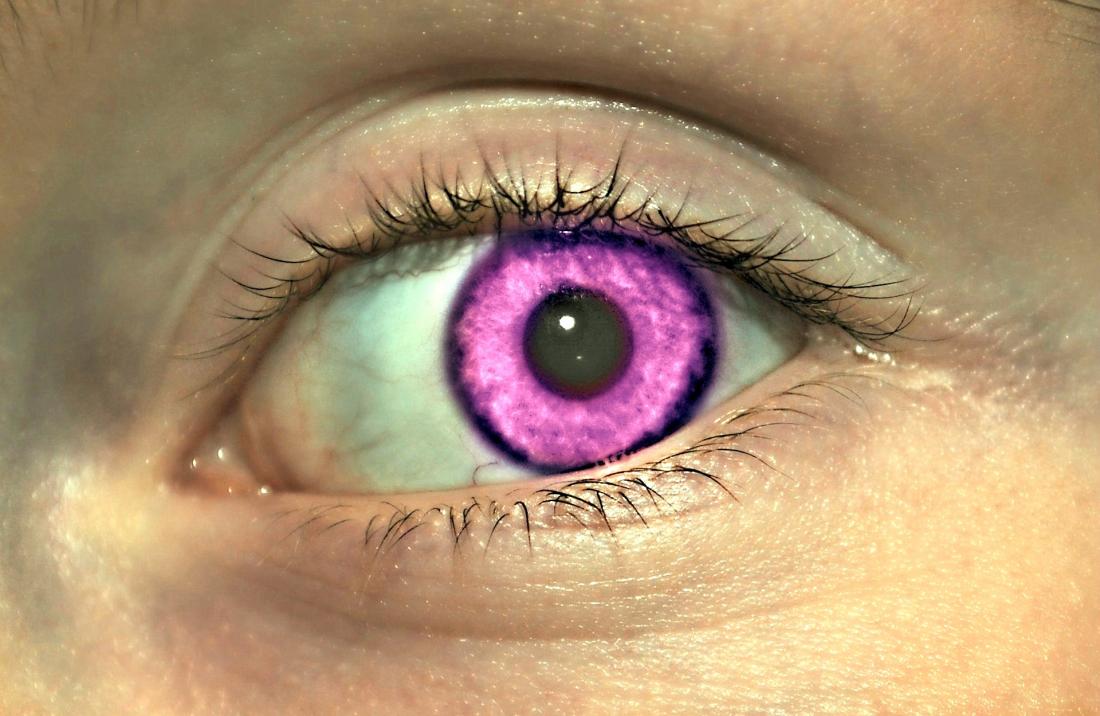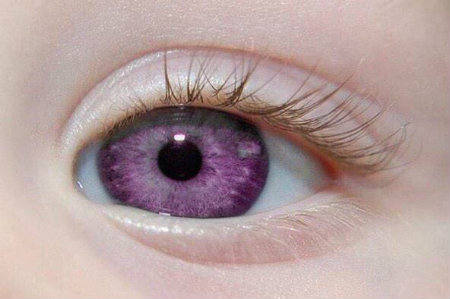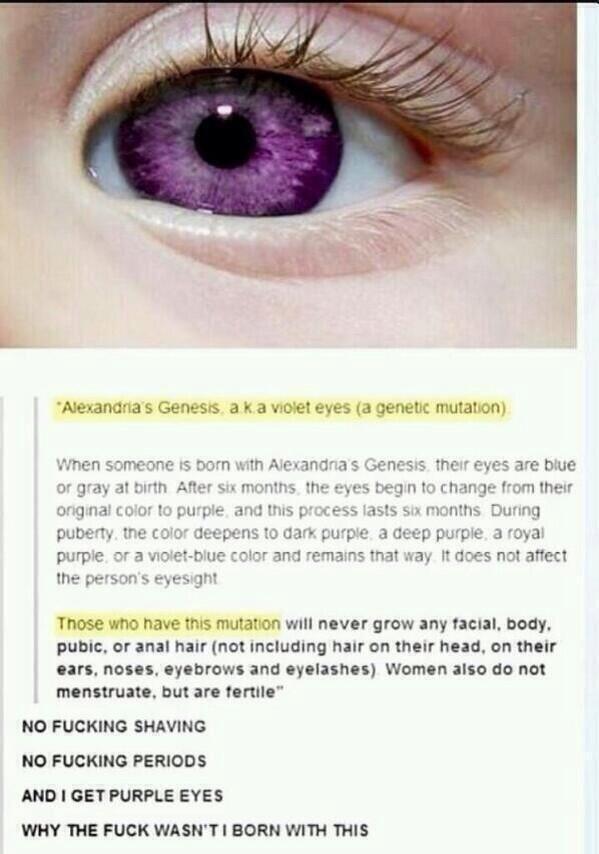 Alexandria's genesis: Is it real?
Alexandria's genesis: Is it real?Genesis of Alexandria: Can your eyes change the color? OverviewThe Genesis of Alexandria is an Internet myth about perfect human beings whose eyes become purple during childhood. According to Snopes, a popular fact-finding site, rumors about this so-called rare genetic mutation have been circulating online from at least until 2005. The myth of Genesis of Alexandria, which has several stories of strange origin, states that people with this condition are born with purple eyes or have eyes that become purple shortly after birth. They also have pale skin and well-provided bodies that do not gain weight. These perfect humans supposedly and produce very little body loss. The Genesis of Alexandria is not a real medical condition. But there are several real living conditions that can affect the color of the eyes. Read more about these conditions. The color of the eye refers to the color of the iris, the colored ring around the pupil that controls how much light enters the eye. The color of Iris, such as hair and skin color, depends on the presence of a protein called melanin. Special cells called melanocytes secrete melanine in your body where necessary. Melanocytes respond to the light (which explains its summer tan). Melanocytes in the eyes of newborns have never been exposed to light, so they have not become fully active. Most babies will be born with brown eyes, regardless of their race. But many Caucasian babies are born with blue or gray eyes. As the melanocytes are activated by light over the first year of a baby's life, the color of the eye can change. Typically, this means moving from a blue/grey (lower melanine) to hazel/green (middle melanine), or to brown (high melanine). In people with heterochromy, the iris of one eye is different from the iris of another. For example, I could have a blue eye and a brown eye. It is also possible that small segments of the same iris are different colors. For example, half the left eye could be blue and half could be brown. Most cases of heterochromy are not associated with other symptoms or medical causes. It is caused by a combination of genetic factors, such as normal eye color. Rarely, heterochromy may be a sign of a congenital condition (present from birth) or the result of an injury or disease. is a rare condition characterized by inflammation in different parts of the eye. In 1906, a doctor named Ernst Fuchs first described the condition of uveitis in people with heterochromy (two different eyes). Theorized that inflammation could play a role in abnormal eye color development. Symptoms of Fuchs heterochromatic uveitis are not well documented, but may include eye color change. Typically, the lighter of the two different colored eyes is affected. The eye can become darker and heterochromy can disappear or reverse. This condition can lead to , , or another. Glucoma is a group of eye conditions that affect the optical nerve and can cause loss of vision and blindness. In the front of your eye, there's a small camera. Fluid moves inside and outside this chamber, nourishing the tissue there. This fluid flows out of the eye through a spongy mesh that acts like a drainage. In open-angle glaucoma (the most common type), the liquid is drained too slowly. This allows the pressure to accumulate in the eye, which can damage the optical nerve. Optical nerve damage can mean loss of vision or blindness. In pigment glaucoma, the colored pigment of the eye breaks down into small granules, causing a block that slows down the drainage of fluid and increases the pressure. The color of the eye does not disappear completely, but there may be changes in the iris. Symptoms of pigment glaucoma are like those of other types of glaucoma. Primary symptom is peripheral vision loss. This makes it hard to see things on your eye side. Glucoma requires careful management by an ophthalmologist or optometrist (here doctor). There are treatments and medicines that can reduce the likelihood of vision loss. Horner syndrome is a group of symptoms caused by the interruption of a nervous path that leads from the brain to the face and eye on one side of the body. Horner syndrome is usually caused by another medical problem, such as a , , or tumor. The symptoms of Horner syndrome include a decrease in the size of the pupil (the black part of the eye), a dipped eyelid and a decrease in sweat on one side of the face. There is currently no specific treatment for this condition. The iris is the colored part of the eye. Tumors can grow both inside and behind the iris. Most iris tumors are cysts or pigmented growths (such as moles), but some are (a form of aggressive and life-threatening cancer). Most people with iris tumors have no symptoms. Sometimes, however, changes can be seen in the appearance of the eye. Thick points and pigments called nevi can change, grow bigger, or pull the student in a different direction. If you suspect an eye tumor, consult with an eye cancer specialist to rule out melanoma or begin cancer treatment. Treatment may involve radiation or surgery. Some glaucoma medications may affect the color of the eyes. Prostaglandin analogues such as latanoprost (Xalatan) work to increase the drainage of the fluid from the eye and reduce pressure accumulation. They do not have many systemic side effects, but are associated with changes in the appearance of the eyes. People who use these glaucoma eye drops may experience eye color changes. Prostaglandin analogs are also marketed as eyelash enhancers such as bimatoprost (Latisse). According to the information presented with the , the possible side effects of Latisse include a permanent obscuration of iris and a possible reversible obscuration of the eyelid. There are rumors of the Internet suggesting that a raw vegan diet can lead to changes in the color of the eyes. While a healthy diet is important to maintain eye health, there is no science to support claims of color change. If you notice any sudden change in the appearance of your eyes, you should make an appointment with an ophthalmologist or optometrist (heye doctor) immediately. Changes in the appearance of the eye can be a sign of an underlying medical condition. If you have sudden changes in your vision, such as or , consult your doctor. Like many Internet rumors that seem too good to be true, Genesis of Alexandria is not real. However, there are real conditions that can affect the color of the eyes. If you are interested in reaching someone's look with the mythical Genesis of Alexandria, color contact lenses can be a good choice for you. Always consult your doctor about any changes in your vision and information about the safety of contact lenses. Last medical review on September 22, 2017Read this following
Accessibility Links Search ModesSearch Results about the genesis of alexandria live the genesis of alexandria Genesis of Alexandria: Purple Eyes Real or False Mutation ... Genesis of Alexandria - Skeptoidmyth or truth? Silence all over the genesis of AlexandriaLiving with the purple eyes (Genesis of Alexandria) - Genesis of YouTubeAlexandriaFood links

alexandria's genesis | Tumblr | Violet eyes, Purple eyes disease, Eye color
Alexandria's genesis: Is it real?
What is Alexandria's Genesis? | Healthmad.com | Purple eyes disease, Purple eyes, Violet eyes
Alexandria's Genesis: Cause & Symptoms | What is it Purple Eye Disease?
Alexandria's Genesis | Snopes.com![Contact lens or the possible hoax called]()
Contact lens or the possible hoax called "Alexandria's Genesis"? | Violet eyes, Eye art, Aesthetic eyes
Alexandria's genesis - a beautiful anomaly that just went viral!
Alexandria's Genesis | Snopes.com
Are Purple Eyes Real? | Is Alexandria's Genesis a Fact? - The Eye News
Alexandria's Genesis – truth or myth? | SiOWfa15: Science in Our World: Certainty and Controversy
savannah purple eyes | Rare eyes, Violet eyes, Beautiful eyes
Are Purple Eyes Real? | Is Alexandria's Genesis a Fact? - The Eye News
Alexandria's genesis: Is it real?
Pin by Sarah Rhoads on Ghost Towns, Haunted places, Strange and just Creepy Things | Rare eyes, Rare eye colors, Violet eyes
Is it possible for humans to mutate other eye colours (e.g. purple, red etc.)? - Quora
How to Appear to Have Alexandria's Genesis (with Pictures)
Alexandria's Genesis: The Fact of Purple-Eyed People – Wittypages
Does Alexandria's Genesis exist? - Skeptics Stack Exchange
Are Purple Eyes Real? | Is Alexandria's Genesis a Fact? - The Eye News
What is Alexandria Genesis - YouTube
Alexandria's Genesis: What Is It?
Alexandria's Genesis – is it Real?
Alexandria's Genesis: Definition, Symptoms & Side-Effects - Lemony Blog![NO SPOILERS] Emilia Clarke with her true violet eyes • /r/gameofthrones | Violet eyes, Aesthetic eyes, Eye close up NO SPOILERS] Emilia Clarke with her true violet eyes • /r/gameofthrones | Violet eyes, Aesthetic eyes, Eye close up](https://i.pinimg.com/originals/43/60/84/436084c60c068b3844504fb1661fe455.jpg)
NO SPOILERS] Emilia Clarke with her true violet eyes • /r/gameofthrones | Violet eyes, Aesthetic eyes, Eye close up
Are Violet Eyes Real (Page 6) - Line.17QQ.com
Alexandria's Genesis (Purple Eyes): Fact Or Fallacy?
Sugabeau — no periods?! I WANT THEM PURPLE EYES OMG
Pinaccurate: Alexandria's Genesis
PURPLE EYES ! Myth or Real ? — Steemit![Nobody: Tumblr in 2010: Alexandria's Genesis is a genetic mutation that causes your eyes to change to purple 6 months after birth] - iFunny :) Nobody: Tumblr in 2010: Alexandria's Genesis is a genetic mutation that causes your eyes to change to purple 6 months after birth] - iFunny :)](https://img.ifunny.co/images/0cd5fb4f4944ac2a9707ce1c6c0a5c4fc776d4ad054c0979f9fa73181780c3fe_1.jpg)
Nobody: Tumblr in 2010: Alexandria's Genesis is a genetic mutation that causes your eyes to change to purple 6 months after birth] - iFunny :)
Alexandria's Genesis: What Is It?
Born with Purple Eyes (Page 1) - Line.17QQ.com
Ever Heard Of Purple Eyes (Alexandria's Genesis)? Elizabeth Taylor Had It!
Alexandria's genesis: Is it real?
Alexandria's Genesis | Is it real? (look it up) With my wide… | Flickr
Alexandria's Genesis – I Was There
Ever Heard Of Purple Eyes (Alexandria's Genesis)? Elizabeth Taylor Had It!
Kementerian Komunikasi dan Informatika
Alexandria's Genesis PURPLE EYES - video Dailymotion
 Alexandria's genesis: Is it real?
Alexandria's genesis: Is it real?




















![NO SPOILERS] Emilia Clarke with her true violet eyes • /r/gameofthrones | Violet eyes, Aesthetic eyes, Eye close up NO SPOILERS] Emilia Clarke with her true violet eyes • /r/gameofthrones | Violet eyes, Aesthetic eyes, Eye close up](https://i.pinimg.com/originals/43/60/84/436084c60c068b3844504fb1661fe455.jpg)





![Nobody: Tumblr in 2010: Alexandria's Genesis is a genetic mutation that causes your eyes to change to purple 6 months after birth] - iFunny :) Nobody: Tumblr in 2010: Alexandria's Genesis is a genetic mutation that causes your eyes to change to purple 6 months after birth] - iFunny :)](https://img.ifunny.co/images/0cd5fb4f4944ac2a9707ce1c6c0a5c4fc776d4ad054c0979f9fa73181780c3fe_1.jpg)






Posting Komentar untuk "is alexandria's genesis real"